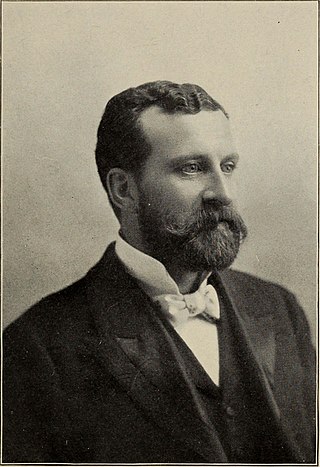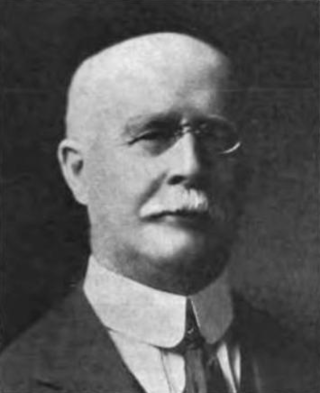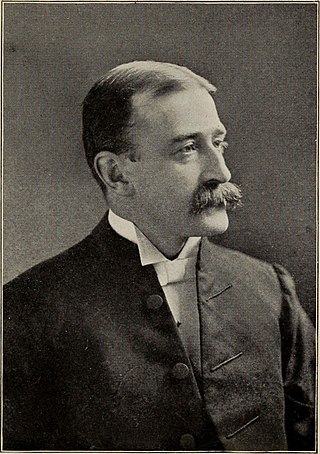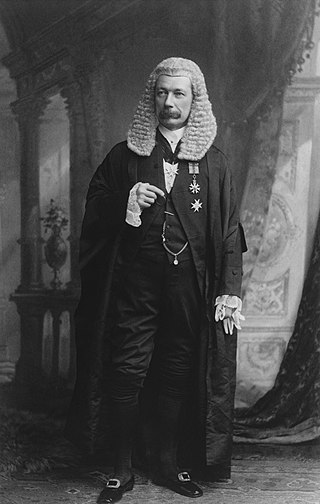Related Research Articles

Sir Robert Bond was the last Premier of Newfoundland Colony from 1900 to 1907 and the first prime minister of the Dominion of Newfoundland from 1907 to 1909 after the 1907 Imperial Conference conferred dominion status on the colony. He was born in St. John's, Newfoundland, as the son of merchant John Bond. Bond grew up in St. John's until 1872 when his father died and left the family a good deal of money. He went to England where he was educated and came back to Newfoundland and articled under Sir William Whiteway.
George Edward Shea was a Newfoundland politician who served as the first mayor of St. John's, Newfoundland.

James Patrick Fox was a politician and office holder, born in St. John’s, Newfoundland to James and Bridget (Power) Fox. James P. Fox was the first person elected to the assembly under a new system under Prime Minister Sir William Whiteway legislation extending the right to vote in elections for the House of Assembly to all males 21 years of age and older.
William Joseph Browne, was a Canadian lawyer, judge and politician. He served in the Newfoundland House of Assembly and the House of Commons of Canada.

Lawrence O'Brien Furlong was a merchant and political figure in Newfoundland. He represented St. John's East in the Newfoundland and Labrador House of Assembly from 1893 to 1904 and was speaker for the assembly from 1894 to 1897 and from 1901 to 1904.

Henry John Bacon Woods was a merchant and political figure in Newfoundland. He represented Bay de Verde from 1889 to 1894, from 1895 to 1897 and from 1900 to 1902.
Maurice Fenelon was an Irish-born educator, merchant and political figure in Newfoundland. He represented St. John's West in the Newfoundland and Labrador House of Assembly from 1871 to 1878.
Patrick J. Scott was a lawyer and political figure in Newfoundland. He represented St. John's West in the Newfoundland and Labrador House of Assembly from 1872 to 1882, from 1885 to 1889 and from 1894 to 1897.

James Francis McGrath was a fisherman and political figure in Newfoundland. He represented Placentia and St. Mary's in the Newfoundland and Labrador House of Assembly from 1885 to 1894 as a Liberal.

Sir Alfred Bishop Morine was a journalist, lawyer and political figure in Newfoundland. He represented Bonavista Bay in the Newfoundland and Labrador House of Assembly from 1886 to 1906 as a Conservative and from 1913 to 1916 as a member of the Fishermen's Protective Union.

John Marshall Lang was a Church of Scotland minister and author. He served as Moderator of the General Assembly in 1893 and later became Principal of the University of Aberdeen in 1900.
James Joseph Louis (Jim) Greene was the Newfoundland and Labrador's Opposition Leader from 1960 to 1965 and leader of the Progressive Conservative Party of Newfoundland. He led the party through the 1962 provincial election in which the party increased its seat total in the Newfoundland House of Assembly from 3 to 7, more than doubling them, and its share of the popular vote from 25% to 36%. The result was not enough to prevent the Liberal government of Joey Smallwood from returning to power with a substantial majority government.

Sir William Henry Horwood was a politician and the Chief Justice of Newfoundland and Labrador from 1902 to 1944. He represented Trinity from 1894 to 1897 and from 1900 to 1902 and Harbour Grace from 1897 to 1900 in the Newfoundland House of Assembly.

Sir John Worrell Carrington, was a British jurist, elected representative, and colonial administrator between 1872 and 1902. He served the Caribbean colonies of Barbados, St. Lucia, Tobago, Grenada, and British Guiana until his final appointment as Chief Justice of Hong Kong.
Thomas J. McCarthy Murphy (1861–1933) was a lawyer and politician in Newfoundland. He represented St. John's East in the Newfoundland House of Assembly from 1886 to 1894 and from 1897 to 1904.
William J. Woodford was a politician in Newfoundland. He represented Harbour Main in the Newfoundland House of Assembly from 1889 to 1900 and from 1908 to 1928.
James Carter Tessier was an English-born merchant and politician in Newfoundland. He represented St. John's West in the Newfoundland House of Assembly from 1893 to 1894 and from 1897 to 1900 as a Liberal.
Henry Gear was a business and politician in Newfoundland. He represented Burin in the Newfoundland House of Assembly from 1894 to 1897 and from 1900 to 1913.
Sir Charles Hutton was a musician, educator, business owner and politician in Newfoundland. He represented St. John's East in the Newfoundland House of Assembly from 1894 to 1897 as a Liberal.
Charles Henry Hutchings was a lawyer and politician in Newfoundland. He represented Bay de Verde in the Newfoundland House of Assembly from 1904 to 1908 as a Liberal.
References
- 1 2 3 4 "Johnson (family)". Association of Newfoundland and Labrador Archives.
- ↑ "Johnson, George Macness". Encyclopedia of Newfoundland and Labrador. pp. 119–20.